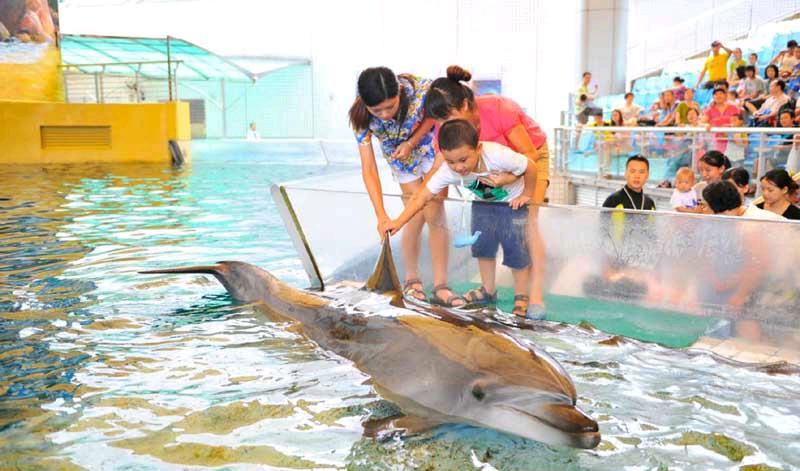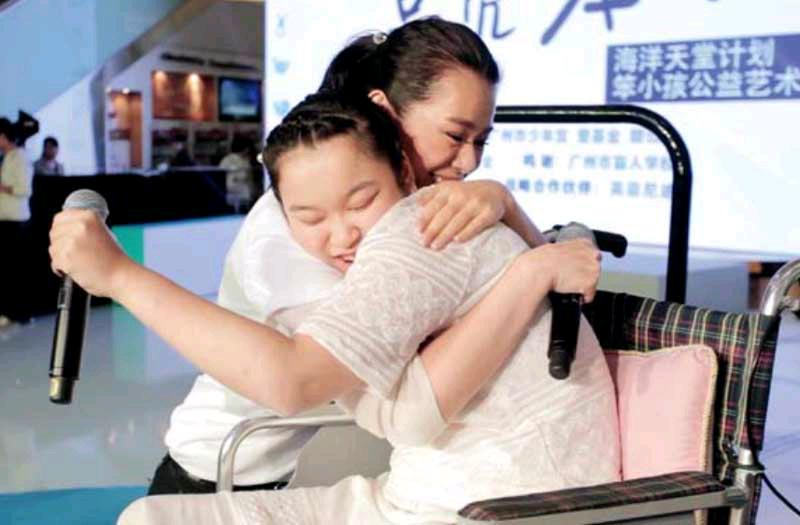A Heavenly Plan
2016-05-28byYinXing
by+Yin+Xing
On March 25, 2016, Liu Huifeng, the program officer for Ocean Heaven Plan, worked late into the night to prepare for World Autism Awareness Day on April 2. His team will release a video depicting a mother and her autistic son. Taotao, the son, spent half a year learning how to fry an egg. His mother, Tian Huiping, explained how she overcame desperate times to live optimistically.
Be One Percent One Day
“One in 68 people has an autism spectrum disorder, amounting to an estimated 1 percent of the worlds population,” stressed Sam Kutesa, president of the General Assembly of the United Nations on the occasion of World Autism Awareness Day last year.
That statistic is why this years Blue Activity of Ocean Heaven Plan was themed “Be One Percent One Day.” “We hope the public feels empathy and that the activity creates greater awareness that autism is a global issue,” says Wang Kai, director of Child Care and Development Department of One Foundation.
In 2010, Jet Li, a world-famous kung fu star and founder of One Foundation, and Wen Zhang shot a film called Ocean Heaven, which depicted the life of an autistic boy and his father. The public was gifted a rare opportunity to witness autistic children and their families up close. Inspired by the movie, One Foundation launched the Ocean Heaven Plan with an aim to help children with special needs. “Families supporting children suffering from autism, cerebral palsy and rare diseases face tremendous economic and emotional pressures,” Wang continues. “We One Foundation has organized great resources to serve these kids and their families. So in 2011, with support from many grassroots rehabilitation centers for special children, we launched the Ocean Heaven Plan.”
From 2011 to 2015, Ocean Heaven Plan provided subsidies for 6,085 special needs kids, as well as a plethora of opportunities for the children and their families to be integrated into society.
Acceptance and Inclusion
From 2011 to 2013, the first phase of Ocean Heaven Plan mainly focused on providing monetary help by giving subsidies to target children through grassroots organizations. Additionally, two Blue Activities were launched for the specific purpose of raising public awareness about autism.
“After the first three years, we were glad to see more frequent and higher quality reports on autism in media alongside more searches for autism material on the internet,” says Ye Wan, director of Public Participation Department of One Foundation. “We also invited third-party professional institutes to evaluate our efforts. The data showed public awareness about autism has risen considerably.”
Still, Wang Kai and his team feel pressure. “Autism is a lifetime affliction,” explains Wang. “Rehabilitation can to some degree improve the behavior of autistic children, but it requires countless repeated exercises. And the effects of rehabilitation often come very slowly or even unpredictably, a process that frustrates both parents and charity providers. Additionally, autistic children and their families need many different kinds of help.”
So, in recent years, the Ocean Heaven Plan has continuously adjusted its projects: From 2014 to 2016, the team is attaching great importance to raising public awareness, accelerating social inclusion and promote related policy. “It is a process of moving from knowledge to understanding to making changes,” Wang remarks. “Like other programs of One Foundation, the Ocean Heaven Plan tries to establish a platform to provide everyone with opportunities to join in solving social problems. But this plan is different because it is the peripheral players who need to change rather than the children. Only when we become more friendly can these children become better. ”
Policy Promotion

In 2015, the team helped establish a mutual-aid network for special needs childrens parents, connecting 37 parental organizations into the largest such group in China. “Also, we worked with the Beijing Star and Rain Institute (Chinas first non-governmental educational organization for autistic children) to create an award for teachers dedicated to special education, with hopes of encouraging more teachers to contribute such work.” This year, the team will cooperate with Beijing Star and Rain Institute to establish the China Institute of Special Education.
Wang Kai is encouraged by the fact that the Chinese government keeps updating policies related to special needs children. In early 2014, the State Council issued Special Education Promotion Plan (2014-2016), aiming to raise the enrollment rate of compulsory education for challenged children to 90 percent by 2016.
“But, a great number of special children and their families are still in difficult situations,” Wang remarks. “And no policy guarantees employment or pensions.”
This March, the Ocean Heaven team joined professors from Tsinghua University to submit two proposals to Chinas highest advisory body, calling for the government to focus on the life-long welfare of autistic people.

